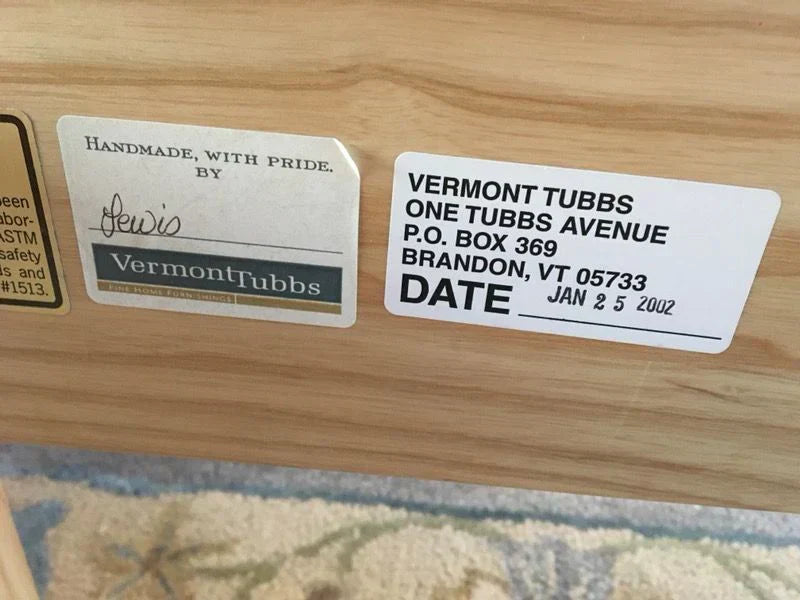Note: While the team at Vermont Woods Studios appreciates the work of Vermont Tubbs, we are not an authorized dealer, nor do we specialize in repairing original pieces. However, we do offer a selection of handcrafted, mid-century inspired designs that celebrate the beautify of solid wood craftsmanship. Browse our full collection of locally crafted pieces or learn more about workshops we do work with.
Vermont Tubbs was founded in 1840 and spent nearly 170 years manufacturing wood furniture in Brandon, VT. At its peak in the early 2000s, the company was generating an estimated $16 million in annual revenue and employed more than 250 people. Its reach extended across the country, with handcrafted furniture sold in major retailers like LL Bean, Jordan’s Furniture, Bloomingdale’s, Restoration Hardware, and Crate & Barrel.
Known for its commitment to high-quality craftsmanship, solid wood construction, and timeless design, Vermont Tubbs helped define the rich history of woodworking in Vermont— values we at Vermont Woods Studios share and deeply admire. As a fellow Vermont furniture company, we see Tubbs not just as a predecessor, but as a cornerstone of the state’s woodworking legacy—one that helped build the foundation for today’s local artisans and workshops.
Here’s how Vermont Tubbs once described its mission:
At Vermont Tubbs we are proud of the furniture that we create. Over time, we have maintained a tradition of enduring design, careful craftsmanship, superior service and a progressive company philosophy. We know that you and your family will be proud to own our handcrafted furniture for generations. Vermont Tubbs is "A home furnishings company where individuals enjoy working together as a team creating fine handcrafted products for the discriminating buyer."
That same spirit lives on in the work we do at Vermont Woods Studios. We continue to honor Vermont’s furniture-making tradition—one piece at a time.
So what happened to Vermont Tubbs? Let’s take a closer look at the company’s rise, its key players, and the industry forces that ultimately led to its closure.
The Rise & Fall of a Classic Vermont Furniture Maker
Unfortunately, Vermont Tubbs is no longer in business. After more than 150 years of operating in Vermont, the company was struggling financially. The business sold a large ownership stake in 2003. It was then acquired fully in 2008 by a furniture manufacturer in New Hampshire. Five years later the company went bankrupt.
Here’s a timeline of the history of Vermont Tubbs:
- 1840: Company Founded
- 2000: Company generates $16m in revenue with 255 employees
- 2001: Company generates $14.7m in revenue. Employment down to 140
- 2002: Company generates almost $12m in revenue. Employment down to 120. Owner William Carris puts company on the market for sale.
- 2003: Vermont Tubbs- “on the edge of bankruptcy” - sold to private investors Fred Musone & Jon McNeil. Employment down to 80
- 2008: Vermont Tubbs sold to BSF Transition LLC, an affiliate of Brown Street Furniture of Whitefield, NH. Annual revenue down to ~$6.5m. Manufacturing plant relocated from Brandon, VT to Whitefield, NH
- 2013: Brown Street Furniture files for bankruptcy
Key Players in the Rise and Fall of Vermont Tubbs
- William Carris: Owner of Carris Financial Holdings and majority owner of Vermont Tubbs until it’s sale in 2003.
- Lee Houston: A consultant and chief executive hired by Carris in 2002 to help turn the business around. Grew up in NC and spent much of his 30+ year career working with furniture manufacturing facilities.
- Jon McNeill: Private investor and Vermont native who purchased the company in 2003. Has founded multiple companies, consulted with Bain & Co, and says his team specializes in “creating and turning around businesses.” He has since gone on to serve as a high-ranking executive at Tesla, Lululemon, and Enservio and is the current COO of Lyft. He’s been recognized as one of the most innovative CEOs in the country (2002), an Entrepreneur of the Year (2012), and Boston’s Most Admired CEO (2013).
- Fred Musone: Private investor who joined McNeill on his investment in 2003. Had an impressive career helping manufacturing businesses follow the modern principles of lean manufacturing established by Toyota.
- Kyle & Adam Tager: Twins and co-owners of BSF Transition, LLC, which bought Vermont Tubbs in 2008, along with Brown Street Furniture that same year. The Tager brothers also owned Mystic Valley Traders, a linen manufacturer in Massachusetts.
- Elwin Wright: Founder and co-owner of BSF Transition, LLC along with the Tager brothers
In 2003, while undergoing a change in ownership, the company cited “dumping from china” as a major reason why sales were declining. Houston noted in 2003 that imported furniture from China had taken over 40% of the US furniture market, a once thriving manufacturing industry.
Asked about China’s competitive edge in the US furniture industry, Lee Houston critiqued that Chinese workers “live in slavery to the central government, and manufacturing plants don't have to worry about environmental regulations.”
The Legacy of Vermont Tubbs
Although the business is no longer operational, Vermont Tubbs left its mark on the Vermont furniture industry.
We’ve often written about the plethora of woodworking talent and long history of furniture craftsmanship here in Vermont. Perhaps no company is more responsible for that history than Vermont Tubbs.
Founded in 1840, Vermont Tubbs preceded many of the other classic Vermont furniture manufacturers like HT Cushman (1892-1971) and Ethan Allen (no longer manufactured in Vermont). It grew mightily and helped establish Vermont as one of the leading states for woodworking talent in the US.
Asked about the talented furniture craftsmen in the state of Vermont, Musone replied, “the quality and commitment of the people who work for Tubbs is just impressive. They are resilient and committed.” Houston remarked, “[Vermont has] the finest workforce I’ve ever seen.”
Carry on the legacy of Vermont craftsmanship.
At Vermont Woods Studios, we’re proud to continue the tradition of handcrafted, solid wood furniture—made right here in Vermont by skilled artisans. Discover pieces built to last for generations.
Shop Vermont-Made FurnitureSources:
- 2003: Vermont Tubbs Plant Saved by 11th Hour Purchase | Times Argus
- 2003: Layoffs at Vermont Tubbs Following 2003 Acquisition | Rutland Herald
- 2008: Brown Street Furniture Acquired by Tager Brothers | Furniture World
- 2008: Brown Street Subsidiary Buys Vermont Tubbs | Furniture Today
-
2008: New Hampshire Firm Acquires Vermont Tubbs | Rutland Herald
- 2008: Vermont Tubbs Consolidates Manufacturing, Moves Facilities to NH | Rutland Herald
- 2008: Vermont Tubbs to Transition Production to New Hampshire | Woodworking Network
- 2013: Brown Street Furniture to Undergo Liquidation | Woodworking Network
- 2013: Company that Bought Vermont Tubbs Goes Under | Rutland Herald


